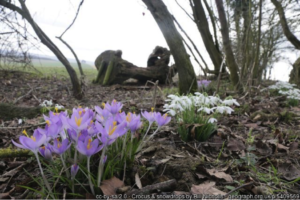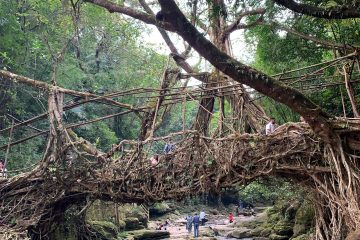Welcome. This is a trauma-informed group.

Counterpoint is a reminder that we need to listen to each other, especially to voices beyond our usual crowds and disciplines, in order to heal the ways we inhabit this planet together. Thus I read Susannah Crockford’s post and, facing my own lack of comprehension about climate change, I feel newly like “the apocalypse is now.” I read Marcia Pally’s post with its litany of gun violence dates all piled into the present, and facing the ridiculous tragedy of current American rhetoric on guns, I arrive again at the awareness that we live already in devastated times.
A few months ago I had the opportunity to hear Autumn Brown and adrienne maree brown in their How To Survive The End of the World podcast live at the University of Minnesota. For all that I’d thought I’d already looked at social privilege and social targeting in my academic and pastoral life, it took me until that night to realize that the apocalypse has come and gone—how else to understand the genocidal devastation of the middle passage, the colonialism that has devastated Native and Indigenous peoples in so many places, and the persistent forms of intimate violence that characterize chronic apocalypse in homes next door and around the world? Turns out there are all kinds of ways that being a white, employed academic—in the U.S. and Christian no less!—has covered over for me the truth that the end times have come and gone.
Apocalypse denotes revelation as much as it means cataclysm; things get uncovered, disrupted: lives, lands, families, ecosystems, thoughts, hegemonies. Apocalypse upends me with its revelation while it has been everyday disclosure to others around me my whole life long. I’m rocked to the core to now realize I hadn’t noticed. I need to be listening.
So I’m resetting my own apocalyptic clock back, way back, to a time before I knew what was happening, a time with jagged edges that has no one moment, a time that shatters chronology and marks the disclosure of our common condition as trauma survivors.
adrienne maree brown writes in her essay “Love as Political Resistance” that “trauma is the common experience of most humans on this planet.”
This truth has become the line that winds my apocalyptic clock for me day by day—or rather it unwinds my clock. It makes me stop and listen even more than I did before. It means I’m approaching all my group work differently now. Classrooms. Meetings. Conversations. Community organizing. Worship. Friendships. All of it is different after the apocalyptic disruptions that mark our common existence.
I’ve been telling the people I work with that I’m doing this. As we start a class, a small group, a work team, I say, at some point as I set the tone for the work:
This might sound a little huge at first, but I wanted you to know that I’m approaching our work with the assumption that most of us are to some degree trauma survivors, whether or not those histories and experiences ever come to the surface here. This will affect how I show up, what I plan for us, and how we might need to change our plans as we go.
This is a trauma-informed group.
I’ll proceed as though trauma is a common experience because we live in a traumatized and traumatizing society where most if not all of us experience or have experienced trauma’s effects to some degree. We are hearing about, imagining, and responding to traumatic events on a daily basis. We are wrapped into thoughts and feelings about trauma through the movie screen or incoming news, by the sound of a siren, in a social media feed about the latest shooting, in our earliest schools when we learn to lock down. I think of this as a generalized sense of trauma characterizing our society and thus many of our lives.
I’ll proceed as though trauma is a common experience because on a different level, and one that deserves to be honored as such, some individuals here have also survived particular and unique acute traumas that we may or may not choose to disclose. I think of these as acute personal traumas.
I’ll proceed as though trauma is a common experience because on another collective level, entire groups have survived or are in the middle of surviving acute traumas. For so many groups in so many different ways, apocalypse has come and gone and these are the after-days of survival and transformation. I think of this as the prevalence of acute collective trauma.
And I’ll proceed as though trauma is a common experience because some of us bear trauma histories and even present trauma of which we are unaware or that we carry on an unconscious level. These are unconscious layers of trauma, and they overlap with everything else.
Our trauma-informed group holds in mind and heart the prevalence of trauma. No matter what form our group work takes or how far from the topic of trauma our shared task is, we can expect that trauma is part of nearly every person’s story here. Rather than surprise or panic, we can greet signs of trauma with steady and gentle acknowledgment. And we can steadily acknowledge any healing work being done by each other as trauma survivors: we can lift up the strength and resiliency in the ability for and commitments to healing we discover in each other.
Welcome. This is a trauma-informed group.
Join me. Do the everyday work of love and life in worlds already unwound by apocalypse.
#
Anna Mercedes is Associate Professor of Theology and Gender Studies at the College of Saint Benedict and Saint John’s University in central Minnesota, USA, and is a pastor in the Evangelical Lutheran Church in America. She is the author of Power For: Feminism and Christ’s Self-Giving and a leader in the Becoming Community grant initiative for transformative inclusion.
Counterpoint blogs may be reprinted with the following acknowledgement: “This article was published by Counterpoint Navigating Knowledge on 9 October 2019.”
The views and opinions expressed on this website, in its publications, and in comments made in response to the site and publications are those of the author(s) and do not necessarily reflect the views and opinions of Counterpoint: Navigating Knowledge, its founders, its staff, or any agent or institution affiliated with it, nor those of the institution(s) with which the author is affiliated. Counterpoint exists to promote vigorous debate within and across knowledge systems and therefore publishes a wide variety of views and opinions in the interests of open conversation and dialogue.




1 Comment
Mantra: These are Trauma Days – Counterpoint: Navigating Knowledge · May 20, 2020 at 4:44 AM
[…] pandemic, I am grateful to the teachers who had shown me, before the new coronavirus, that the apocalypse had come and gone and that many have adapted and learned to survive. In the U.S. context, the middle passage taken […]